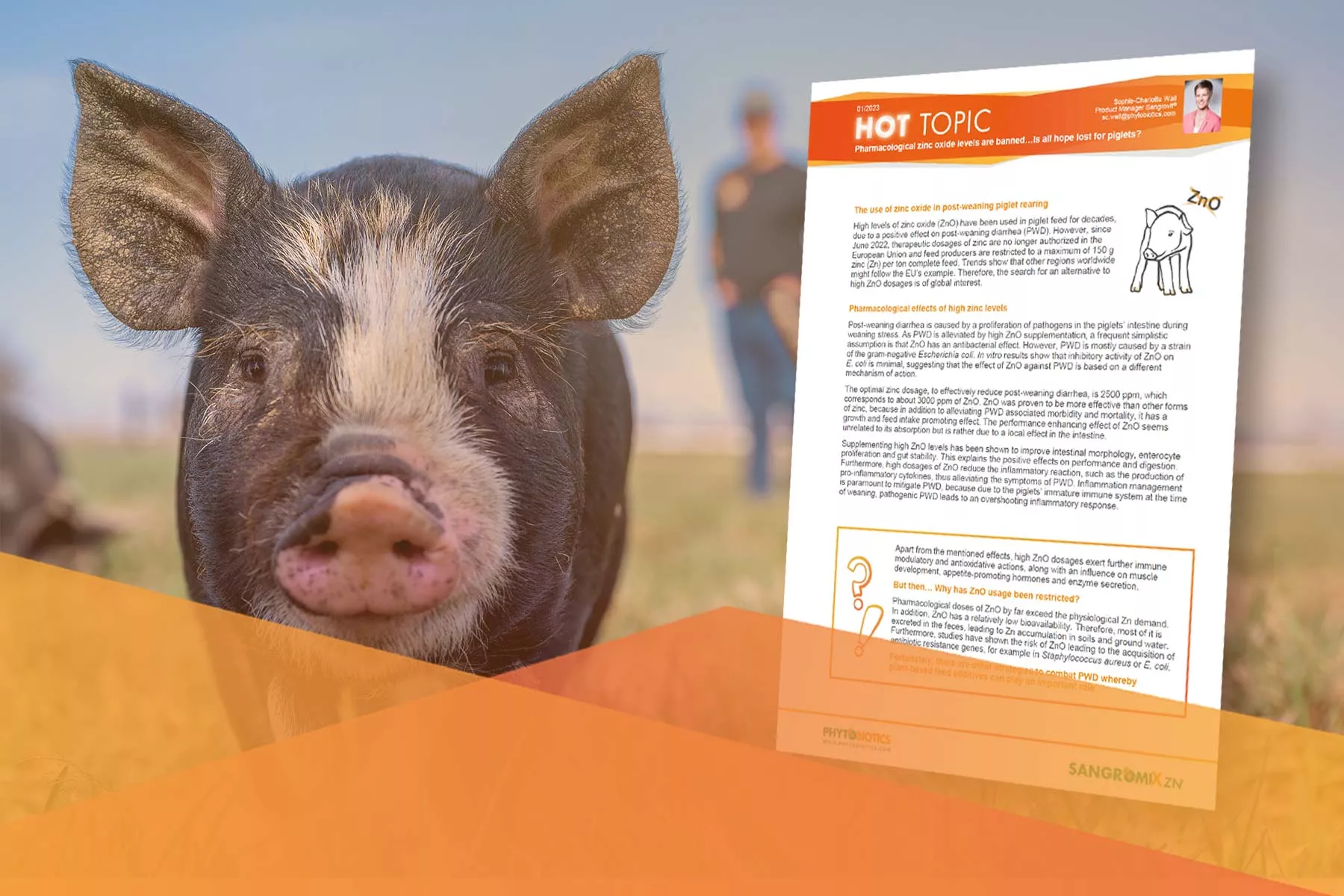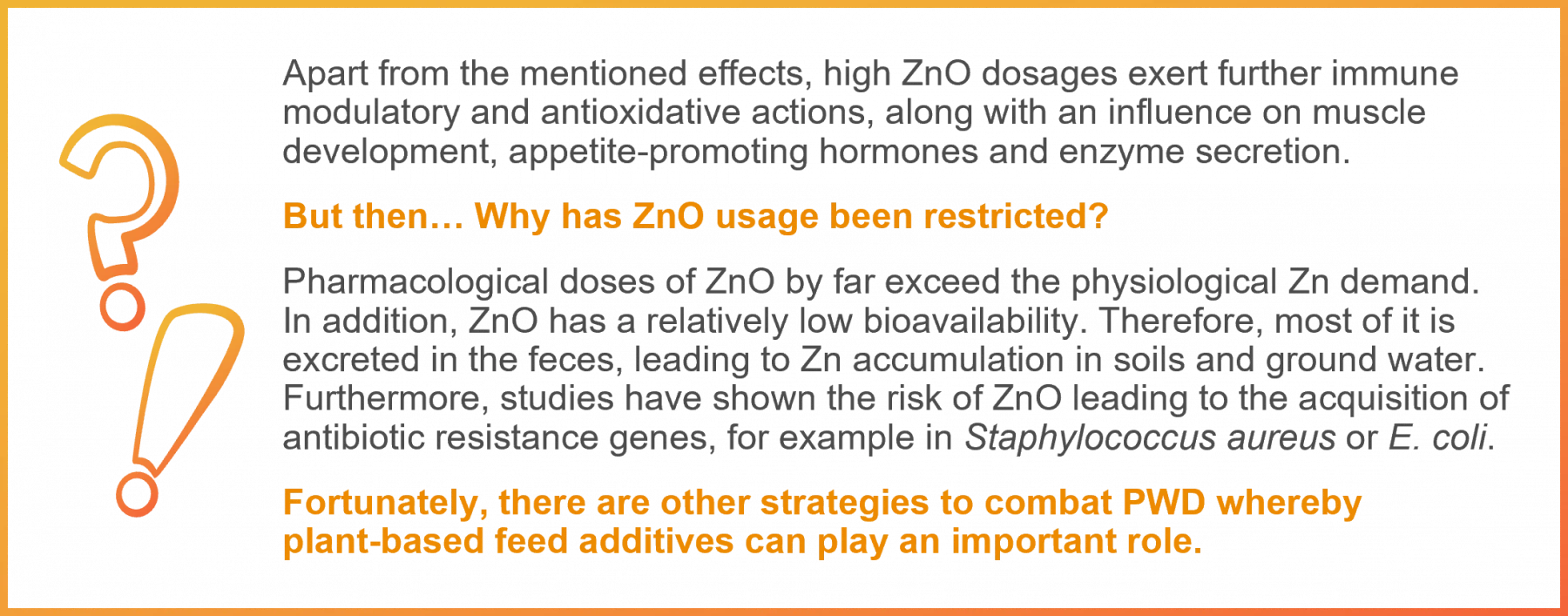

The use of zinc oxide in post-weaning piglet rearing
High levels of zinc oxide (ZnO) have been used in piglet feed for decades, due to a positive effect on post-weaning diarrhea (PWD). However, since June 2022, therapeutic dosages of zinc are no longer authorized in the European Union and feed producers are restricted to a maximum of 150 g zinc (Zn) per ton complete feed. Trends show that other regions worldwide might follow the EU’s example. Therefore, the search for an alternative to high ZnO dosages is of global interest.
Pharmacological effects of high zinc levels
Post-weaning diarrhea is caused by a proliferation of pathogens in the piglets’ intestine during weaning stress. As PWD is alleviated by high ZnO supplementation, a frequent simplistic assumption is that ZnO has an antibacterial effect. However, PWD is mostly caused by a strain of the gram-negative Escherichia coli. In vitro results show that inhibitory activity of ZnO on
E. coli is minimal, suggesting that the effect of ZnO against PWD is based on a different mechanism of action.
The optimal zinc dosage, to effectively reduce post-weaning diarrhea, is 2500 ppm, which corresponds to about 3000 ppm of ZnO. ZnO was proven to be more effective than other forms of zinc, because in addition to alleviating PWD associated morbidity and mortality, it has a growth and feed intake promoting effect. The performance enhancing effect of ZnO seems unrelated to its absorption but is rather due to a local effect in the intestine.
Supplementing high ZnO levels has been shown to improve intestinal morphology, enterocyte proliferation and gut stability. This explains the positive effects on performance and digestion. Furthermore, high dosages of ZnO reduce the inflammatory reaction, such as the production of pro-inflammatory cytokines, thus alleviating the symptoms of PWD. Inflammation management is paramount to mitigate PWD, because due to the piglets’ immature immune system at the time of weaning, pathogenic PWD leads to an overshooting inflammatory response.

Replacing the anti-inflammatory effect of pharmacological ZnO dosages
The positive effect of ZnO on PWD mainly lies in its anti-inflammatory and gut-health promoting properties. Therefore, botanical active ingredients with similar effects can be a viable alternative. There is abundant scientific evidence on the anti-inflammatory action of isoquinoline alkaloids (IQ) contained for example in the poppy type Macleaya cordata. Trials have shown beneficial effects on gut health, such as improved villus and crypt morphology, higher tight junction stability and gut barrier function. IQs have been applied successfully to support animals in stressful periods, such as piglets after weaning. Consequently, PWD can be prevented while maintaining performance and reducing in-feed antibiotics.
Making low Zn dosages count
It has been found that the antibacterial effect of ZnO is stronger when ZnO particles are ground to a smaller, micronized size. Studies have also shown that feeding micronized ZnO, abiding by the new EU dosage limitations, can have positive effects on intestinal health comparable to pharmacological doses of ZnO, while also covering the physiological Zn demand of the animals.
Putting an innovative combination to the test
The benefits of micronized Zn and the tried and tested anti-inflammatory properties of IQs make them a good combination for a natural approach to prevent PWD without pharmacological dosages of ZnO.
Promising results were obtained in a field trial in Italy, carried out in April 2022. This farm
has frequent occurrence of PWD, which were controlled used 3000 ppm of ZnO. In this trial, 3000 ppm of ZnO was compared to a combination product containing 100 ppm of micronized ZnO (mZnO) and a commercial botanical product containing IQs. The trial was carried out with 100 piglets for 15 days after weaning at 24 days of age.
The farm manager was satisfied with the results obtained in the combination group, since they were comparable to the performance seen in the conventional ZnO group. In both groups, the uniformity was good throughout the trial and there was no major occurrence of diarrhea, making in-feed antibiotics unnecessary.


Kontaktieren Sie unsere Experten oder schicken Sie uns eine Nachricht. Wir melden uns schnellstmöglich bei Ihnen.